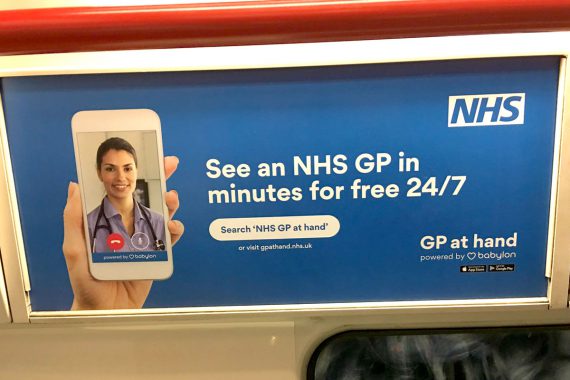Babylon set to join primary care networks across England

Babylon will be forced to open new premises across England, and existing primary care networks will be obliged to take them on under new proposals launched today by NHS England.
Under the new plans, which are being consulted on by NHS England, once a practice has more than a certain number of out-of-area patients in a particular CCG – either 1,000 or 2,000 – they will be forced to hold a new contract in that CCG.
This will be an APMS contract, and the practice will be required to open a premises in that CCG.
Existing primary care networks will then be obliged to take on these new practices from April 2020 under the plans.
Local GP leaders branded the move a ‘disaster’, warning that the Babylon model is ‘careering out of control’.
Babylon has used NHS England’s out-of-area ‘choice’ scheme – which allows practices to register patients from outside their boundaries without the requirement to offer home visits – to sign up patients across London and soon Birmingham to access digital consultations through its ‘GP at Hand’ practice based in Lillie Road, Hammersmith. It stresses that it also offers home visits to patients wherever they are based.
This has proved controversial, with GPs warning that this attracts younger, healthier patients, leaving traditional practices to treat vulnerable patients who require more care, but without the requisite funding.
Pulse has also reported that Babylon has been allowed to form its own primary care network, which will include patients in Birmingham. NHS England has said is a ‘temporary measure’.
In a new consultation launched today, which will run for two months, NHS England has suggested that when digital providers have high numbers of patients registered outside the area in a single CCG, it should automatically trigger a new APMS contract and would require a physical premise in that CCG.
This APMS contract would not be put out to procurement, it added.
In a briefing with Pulse, Ed Waller, NHS England primary care strategy and contracts director, said: ‘We have looked at the way we might reform the out-of-area (OOA) scheme to take account of digital-first primary care models. We concluded we should effectively require the practice operating an OOA model to disaggregate their lists into new and separate practice lists in CCGs where they collect enough patients.
‘We propose that if you have between 1,000-2,000 patients in another CCG registered as OOA with a practice, that should automatically trigger a process of creating a new contract. The effect that has is that those patients are served by a local contract held by a local CCG and it promotes the integration of that practice’s services.’
Ian Dodge, NHS England national director for strategy and innovation, added: ‘We are creating PCNs and we wanted to make sure that if you register with a GP, you get the full range of services as part of that registration. That means that even if a large amount of the contact is digital, there will always be times where there is a need for access to a physical premise.’
He added: ‘To give a practical example, if we settled on 2,000 patients as a threshold, then that would mean that the list from Lillie Road Hammersmith would reduce. Its patients in Tower Hamlets would automatically go into an APMS contract held by GP at Hand in NHS Tower Hamlets CCG, and GP at Hand would have to have premises in Tower Hamlets and would have to be a member of a local PCN and offer a full range of services.’
He said that he doesn’t envisage that there will be problems with existing PCNs, who would be required to take on these new practices.
He said: ‘Every practice has a right to be part of a network. It requires brokery. We expect that in Tower Hamlets, for example, [Babylon] will be able to join a network.
‘We haven’t had a big problem around APMS practices being excluded from PCNS and LMCs have been supportive. We are relatively confident it will be possible to come up with a result.’
However, Dr Jackie Applebee, chair of Tower Hamlets CCG, told Pulse: ‘This is a disaster. It can’t be allowed.
‘NHS England seem determined to let Babylon/GP at Hand succeed whatever the evidence and whatever the opinion of the rest of the profession. The Ipsos Mori poll confirmed that they attract younger patients who are generally healthy but are higher than average users of the health service. Confirming that this model prioritises care for those who need it least at the expense of those who need it most.
‘This whole thing is careering forward like a juggernaut out of control, it undermines the foundation of general practice and diverts care from those who need it most. I can’t understand why NHS England is promoting it.’
A spokesperson for Babylon said: ’NHS England believe in a digital-first NHS and their new consultation is a sensible step in ensuring it rolls out in a way that best suits patients and allows people to choose the GP practice that works for them.
’The benefits of digital-first services are obvious as, without costing the NHS a penny more, we can offer appointments 24 hours a day every day of the year which is great for patients and the NHS. Digital appointments are fantastic, but there are a minority of appointments for which you need to see a GP face-to-face – this is a core part of Babylon GP at Hand’s full NHS primary care service, and we are the only digital-first provider with physical clinics (currently six but more are planned).
’We are very pleased to see that NHS England have said ”it is important to support patients’ active choice of a new service”. There are lots of details to discuss, but this looks like an important step to enable more people to enjoy digital-first services.’









